Discover 30 stunning orange flower varieties that thrive in the USA. Learn how to identify, grow and care for these vibrant blooms with our in-depth guide.
Orange flowers are a cheerful and eye-catching addition to any garden. From bright marigolds to delicate lilies, there are dozens of stunning orange flower varieties that can thrive across the United States. In this comprehensive guide, we’ll introduce you to 30 types of orange flowers, providing details on their identifying features, growth requirements and visual appeal.
Whether you’re a seasoned gardener or just starting to explore the world of horticulture, this article will equip you with the knowledge to select, plant and care for a wide range of beautiful orange flowers. Get ready to add some vibrant pops of color to your outdoor spaces!
1. Marigold
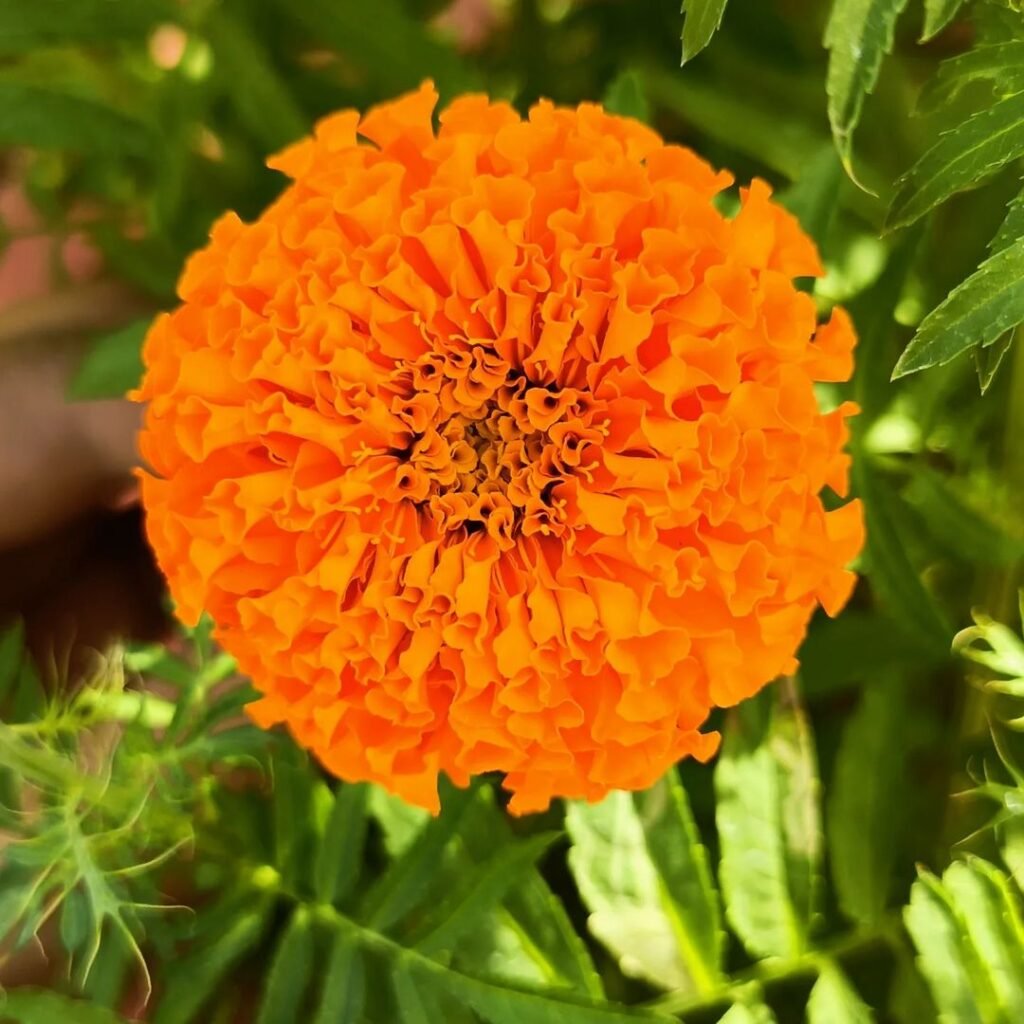
Here’s a short information chart for Marigolds:
| Attribute | Information |
|---|---|
| Botanical Name | Tagetes spp. |
| Plant Type | Annual |
| Soil Type | Well-drained, fertile soil |
| Color Varieties | Yellow, orange, red, and bi-colors |
| Zones | 2-11 (USDA Hardiness Zones) |
| Exposure | Full sun |
| Bloom Time | Summer to fall |
| Height/Spread | 6 inches to 3 feet tall / 6 inches to 1 foot wide |
Marigolds are one of the most popular and easily recognizable orange flowers. These cheerful annuals come in a range of warm hues, from sunny yellows to deep, burnt oranges. Marigolds are known for their pungent, almost spicy fragrance and finely textured, feathery foliage. They make excellent border plants, container gardens, and cut flowers.
2. Dahlia
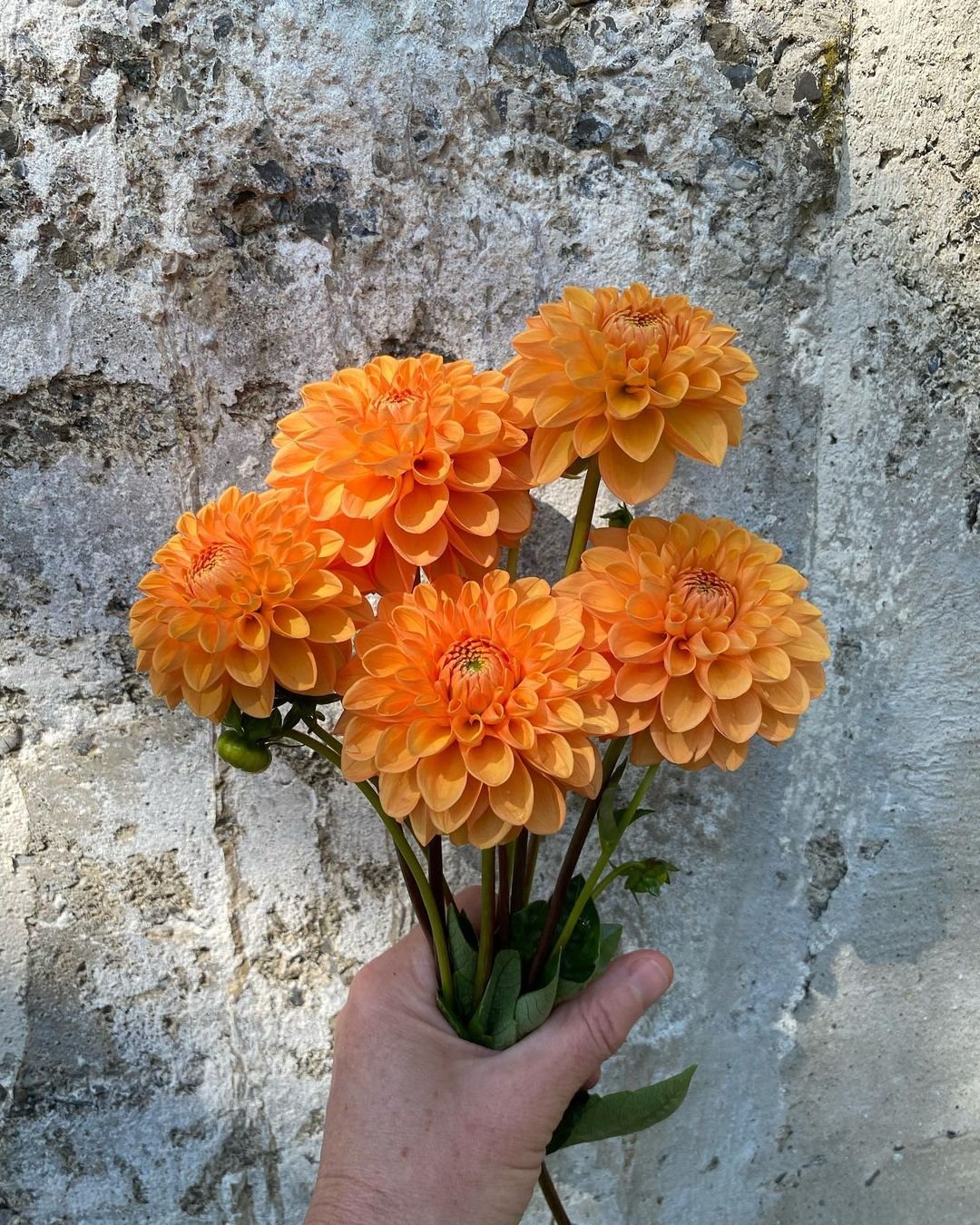
Here’s a short information chart for Dahlias:
| Attribute | Information |
|---|---|
| Botanical Name | Dahlia spp. |
| Plant Type | Tuberous perennial |
| Soil Type | Well-drained, fertile soil |
| Color Varieties | Various, including red, orange, yellow, pink, purple, white and bi-colors |
| Zones | 8-11 (USDA Hardiness Zones), grown as annuals in cooler climates |
| Exposure | Full sun |
| Bloom Time | Summer to fall |
| Height/Spread | 1-6 feet tall / 1-3 feet wide |
Dahlias are show-stopping flowers that bloom in a stunning array of colors, including vibrant oranges. These tuberous plants produce large, lush blooms atop tall, sturdy stems. Dahlia flowers can range from small, single-petal varieties to massive, showy pom-pom types. They make beautiful cut flowers and are a favorite among gardeners and florists
3. Daylily

Here’s a short information chart for Daylilies:
| Attribute | Information |
|---|---|
| Botanical Name | Hemerocallis spp. |
| Plant Type | Herbaceous perennial |
| Soil Type | Well-drained, fertile soil |
| Color Varieties | Various, including orange, yellow, pink, red and bi-colors |
| Zones | 3-9 (USDA Hardiness Zones) |
| Exposure | Full sun to partial shade |
| Bloom Time | Summer |
| Height/Spread | 1-4 feet tall / 1-3 feet wide |
Daylilies are a versatile and easy-to-grow perennial that come in a wide range of captivating orange hues. These flowers, which get their name from the fact that each bloom only lasts for a single day, feature delicate, lily-like petals and tall, slender stems. Daylilies are drought-tolerant, low-maintenance and ideal for planting in mass displays or along borders.
4. Sunflower
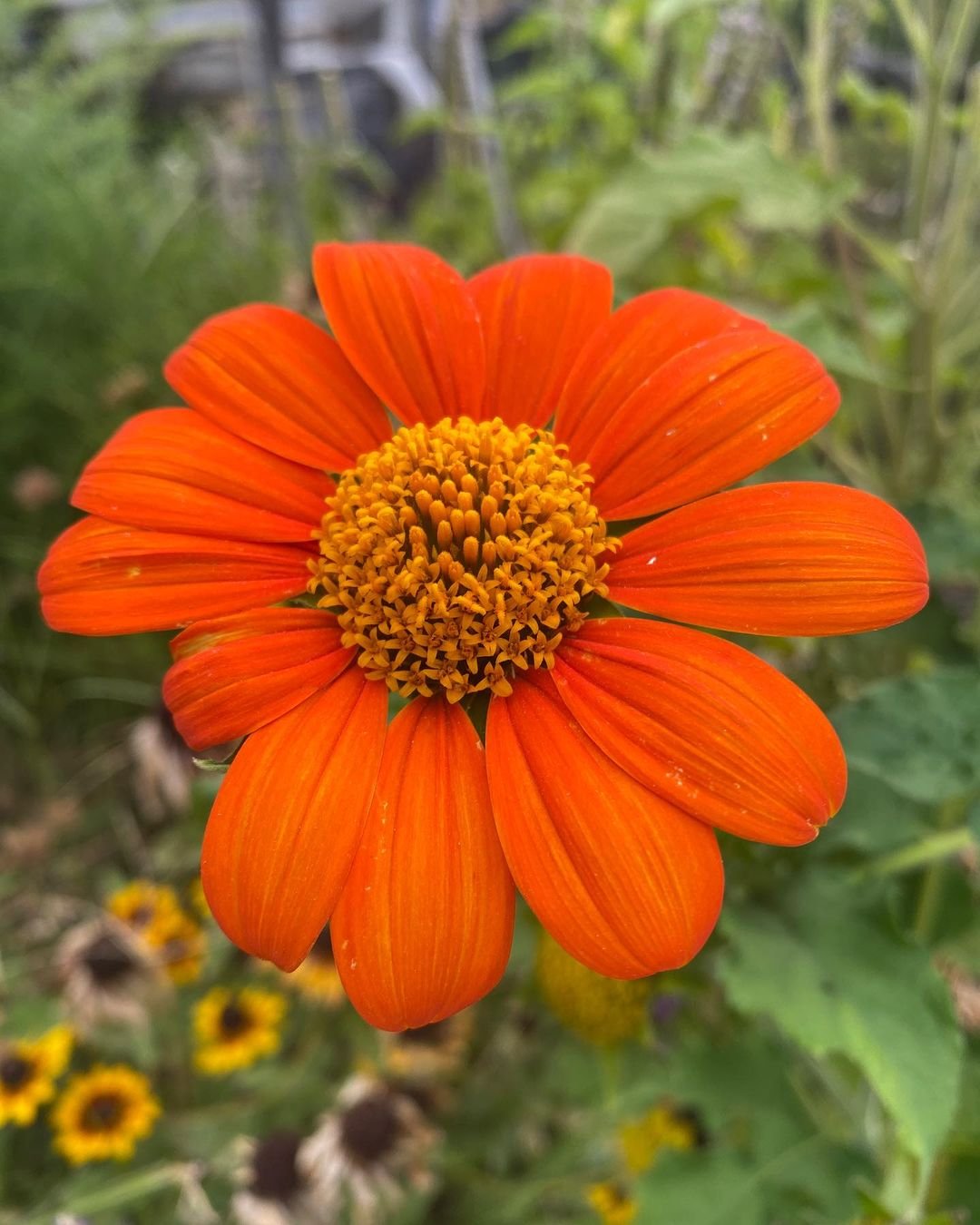
Here’s a short information chart for Sunflowers:
| Attribute | Information |
|---|---|
| Botanical Name | Helianthus annuus |
| Plant Type | Annual |
| Soil Type | Well-drained, fertile soil |
| Color Varieties | Mostly yellow, also orange, red and bi-colors |
| Zones | 4-10 (USDA Hardiness Zones) |
| Exposure | Full sun |
| Bloom Time | Summer to fall |
| Height/Spread | 3-12 feet tall / 1-3 feet wide |
Sunflowers are undoubtedly one of the most iconic and cheerful orange flowers. While the majority of sunflower varieties feature bright yellow petals, there are several stunning orange cultivars as well. These large, attention-grabbing blooms are perfect for adding a pop of vibrant color to gardens, cut flower arrangements and even edible landscapes.
5. Calendula

Here’s a short information chart for Calendula:
| Attribute | Information |
|---|---|
| Botanical Name | Calendula officinalis |
| Plant Type | Annual or perennial |
| Soil Type | Well-drained, fertile soil |
| Color Varieties | Yellow, orange, and bi-colors |
| Zones | 2-11 (USDA Hardiness Zones) |
| Exposure | Full sun to partial shade |
| Bloom Time | Spring to fall |
| Height/Spread | 1-2 feet tall / 1-1.5 feet wide |
Also known as pot marigolds, calendulas are bright, daisy-like flowers that bloom in shades of golden orange and sunshine yellow. These resilient annuals are easy to grow and self-seed readily, making them a great choice for beginner gardeners. Calendulas have a lightly spicy, almost peppery scent and their edible petals can be used to add a splash of color to salads and other dishes.
6. Canna Lily
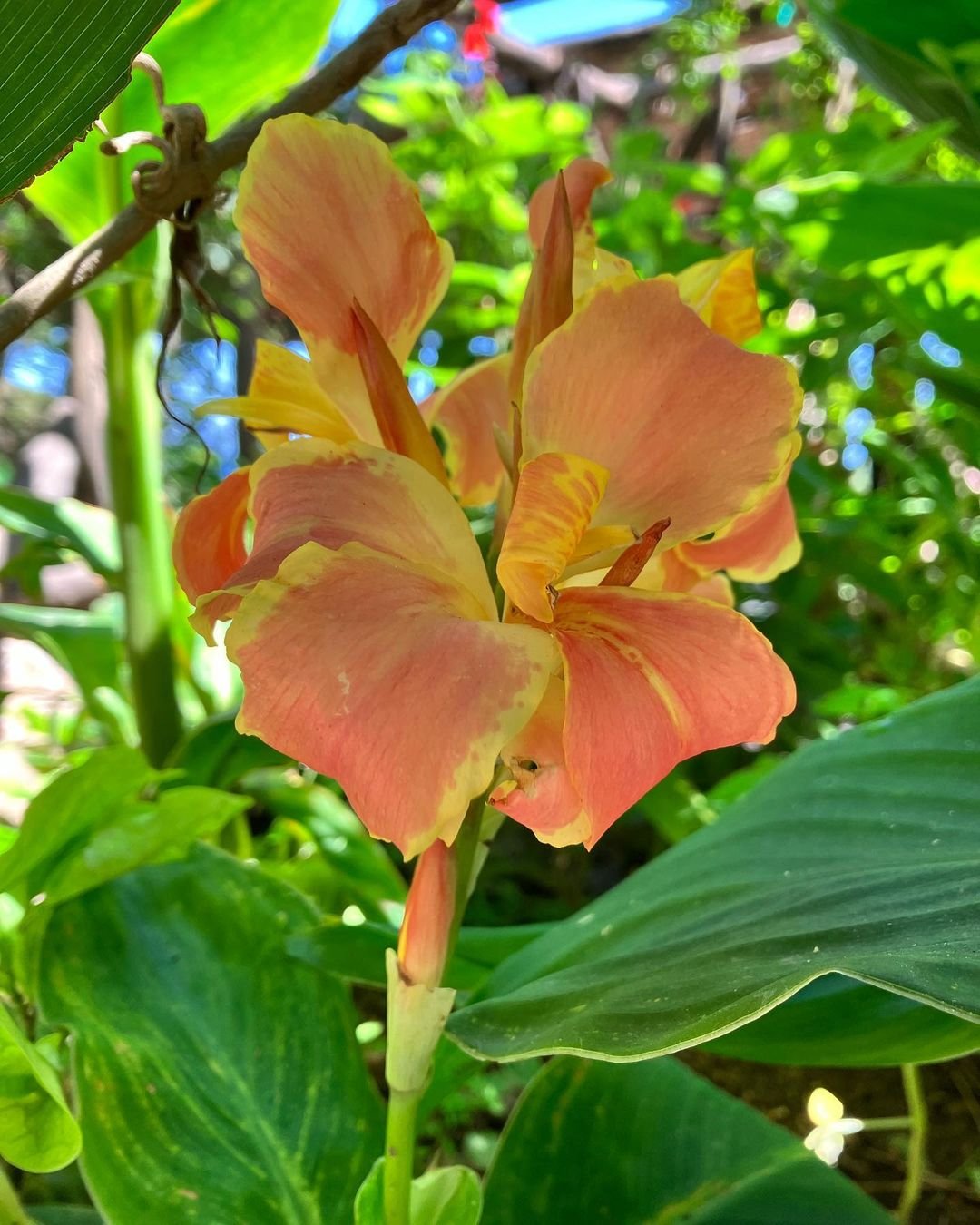
Here’s a short information chart for Canna Lily:
| Attribute | Information |
|---|---|
| Botanical Name | Canna spp. |
| Plant Type | Herbaceous perennial |
| Soil Type | Rich, well-draining soil |
| Color Varieties | Various, including red, orange, yellow, pink and bi-colors |
| Zones | 7-11 (USDA Hardiness Zones) |
| Exposure | Full sun to partial shade |
| Bloom Time | Summer to fall |
| Height/Spread | 1-8 feet tall / 1-3 feet wide |
Canna lilies are tropical-looking perennials that produce large, lush flowers in shades of orange, red and yellow. These bold, attention-grabbing plants feature broad, paddle-shaped leaves and sturdy, upright stems that support their exotic blooms. Canna lilies thrive in warmer climates and make excellent additions to beds, borders and container gardens.
7. Zinnia

Here’s a short information chart for Zinnias:
| Attribute | Information |
|---|---|
| Botanical Name | Zinnia spp. |
| Plant Type | Annual |
| Soil Type | Well-drained, fertile soil |
| Color Varieties | Various, including red, orange, yellow, pink, white, and bi-colors |
| Zones | 3-10 (USDA Hardiness Zones) |
| Exposure | Full sun |
| Bloom Time | Summer to fall |
| Height/Spread | 6 inches to 4 feet tall / 6 inches to 2 feet wide |
Zinnias are vibrant, easy-to-grow annuals that come in a remarkable array of colors, including several shades of orange. These cheerful flowers feature a classic daisy-like shape with tightly packed, velvety petals. Zinnias are long-blooming, low-maintenance and make wonderful cut flowers.
8. Cosmos

Here’s a short information chart for Cosmos:
| Attribute | Information |
|---|---|
| Botanical Name | Cosmos spp. |
| Plant Type | Annual |
| Soil Type | Well-drained, moderately fertile soil |
| Color Varieties | Various, including white, pink, red, orange and bi-colors |
| Zones | 2-11 (USDA Hardiness Zones) |
| Exposure | Full sun |
| Bloom Time | Summer to fall |
| Height/Spread | 1-6 feet tall / 1-2 feet wide |
Cosmos are airy, delicate flowers that thrive in sunny, well-drained areas. While many cosmos varieties feature shades of pink and white, there are also several orange-hued cultivars. These graceful, finely-textured blooms dance atop slender stems, creating an almost ethereal appearance in the garden.
9. Lilies

Here’s a short information chart for Lilies:
| Attribute | Information |
|---|---|
| Botanical Name | Lilium spp. |
| Plant Type | Perennial |
| Soil Type | Well-drained, fertile soil |
| Color Varieties | Various, including white, yellow, orange, pink, red and bi-colors |
| Zones | 3-9 (USDA Hardiness Zones) |
| Exposure | Full sun to partial shade |
| Bloom Time | Summer |
| Height/Spread | 1-8 feet tall / 1-3 feet wide |
Lilies are stately, trumpet-shaped flowers that come in a wide range of captivating colors, including several stunning orange varieties. These bulbous perennials feature large, vibrant blooms atop tall, sturdy stems. Oriental, Asiatic and Tiger Lilies are just a few of the many types of orange lilies that can add elegance and beauty to your garden.
10. Peony

Here’s a short information chart for Peonies:
| Attribute | Information |
|---|---|
| Botanical Name | Paeonia spp. |
| Plant Type | Herbaceous perennial |
| Soil Type | Well-drained, fertile soil |
| Color Varieties | Various, including white, pink, red and bi-colors |
| Zones | 3-8 (USDA Hardiness Zones) |
| Exposure | Full sun to partial shade |
| Bloom Time | Late spring to early summer |
| Height/Spread | 1-3 feet tall / 1-3 feet wide |
Peonies are lush, fragrant flowers that are prized for their large, showy blooms. While pink and white are the most common peony colors, there are also several varieties that feature warm, fiery orange hues. These herbaceous perennials produce massive, rose-like flowers that add a touch of old-world elegance to gardens.
11. Hibiscus
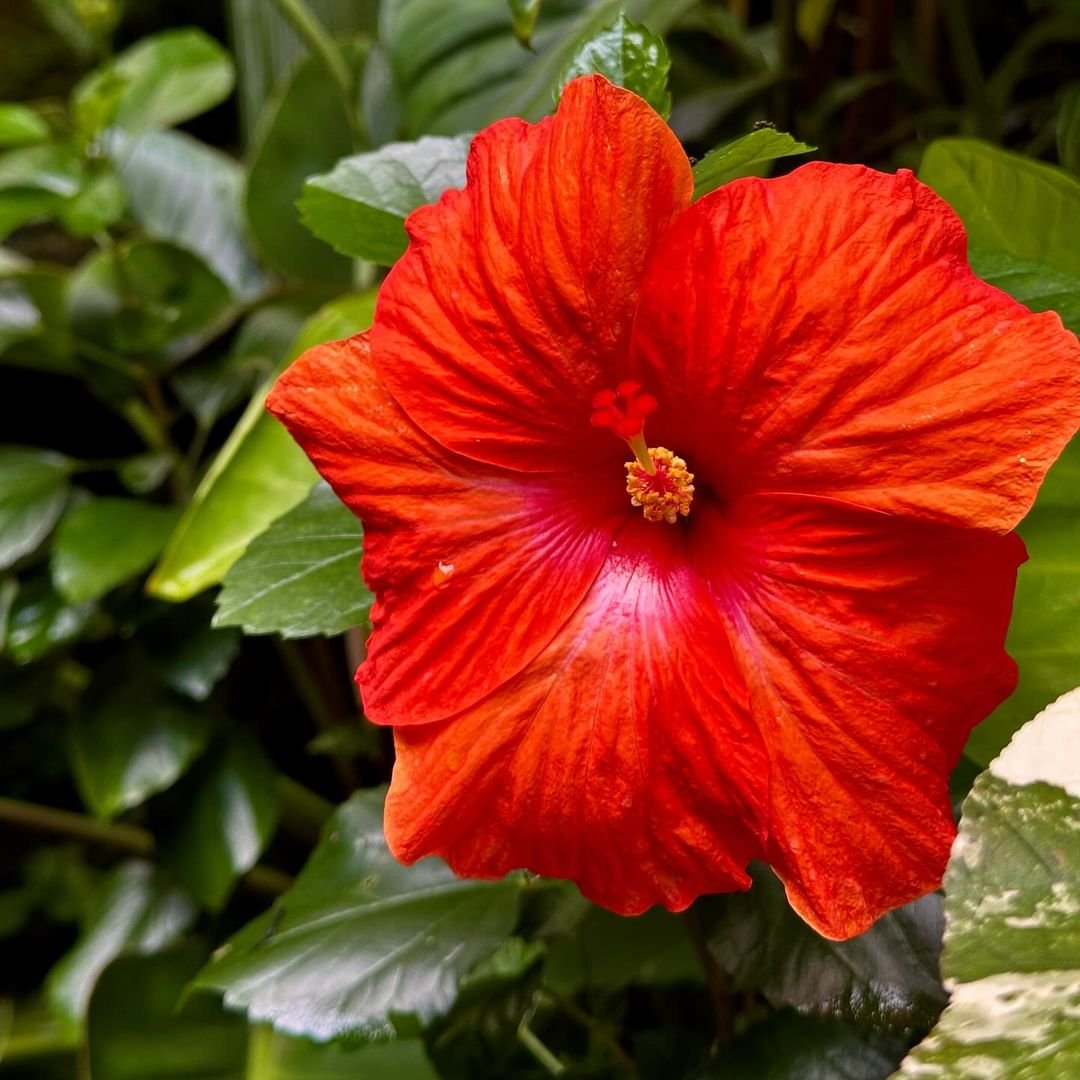
Here’s a short information chart for Hibiscus:
| Attribute | Information |
|---|---|
| Botanical Name | Hibiscus spp. |
| Plant Type | Perennial shrub or small tree |
| Soil Type | Well-drained, fertile soil |
| Color Varieties | Various, including red, pink, yellow, orange and bi-colors |
| Zones | 4-11 (USDA Hardiness Zones) |
| Exposure | Full sun to partial shade |
| Bloom Time | Summer to fall |
| Height/Spread | 3-15 feet tall / 3-10 feet wide |
Hibiscus are tropical-looking flowers that thrive in warm, sunny climates. These large, bold blooms come in a range of vibrant colors, including several stunning orange varieties. Hibiscus plants feature lush, green foliage and sturdy, upright stems that support their eye-catching flowers.
12. Kangaroo Paw
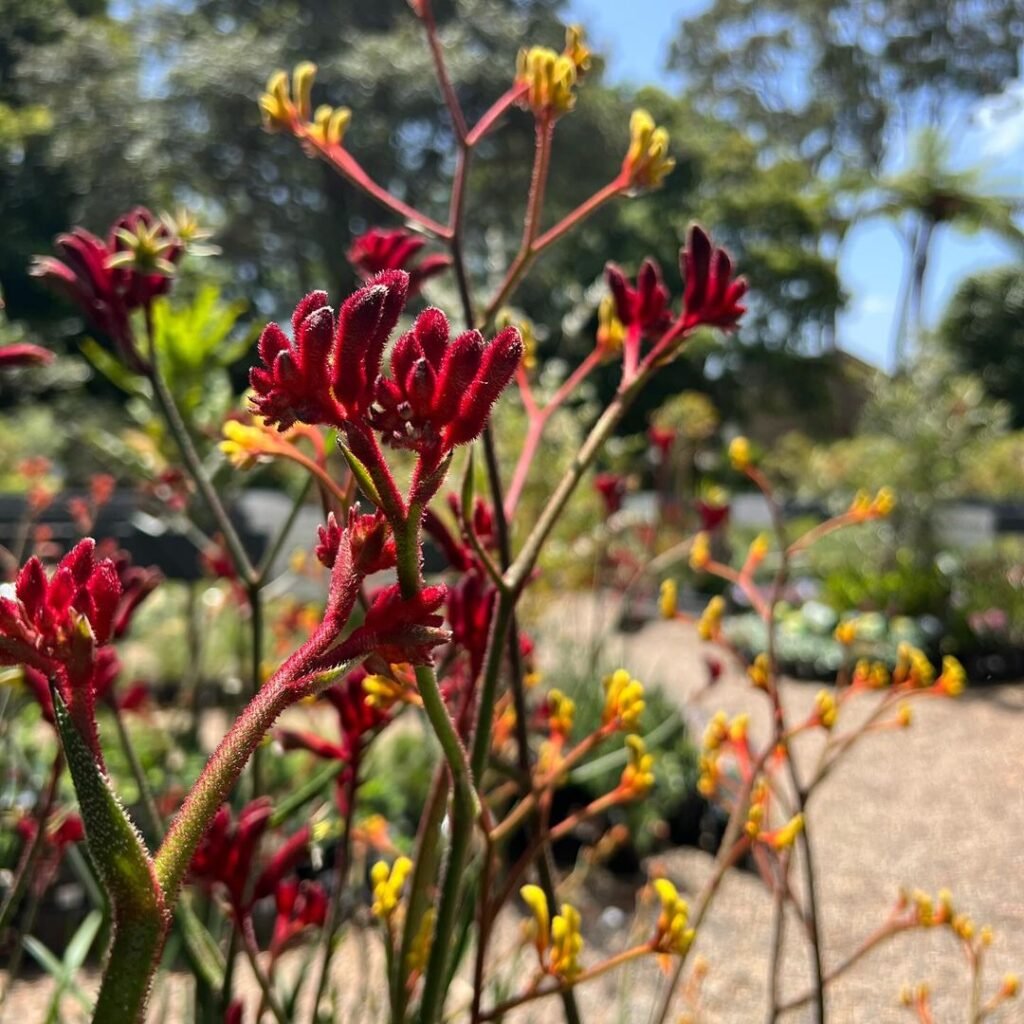
Here’s a short information chart for Kangaroo Paw:
| Attribute | Information |
|---|---|
| Botanical Name | Anigozanthos spp. |
| Plant Type | Perennial herbaceous plant |
| Soil Type | Well-drained, sandy soil |
| Color Varieties | Various, including red, orange, yellow, pink and bi-colors |
| Zones | 9-11 (USDA Hardiness Zones) |
| Exposure | Full sun to partial shade |
| Bloom Time | Spring to summer |
| Height/Spread | 1-4 feet tall / 1-2 feet wide |
Kangaroo paws are unique, exotic-looking flowers that resemble the paws of their namesake marsupial. These distinctive blooms come in shades of orange, red, and yellow and feature fuzzy, claw-like petals. Kangaroo paws thrive in warm, Mediterranean-like climates and make stunning additions to beds, borders and container gardens.
13. Coneflower
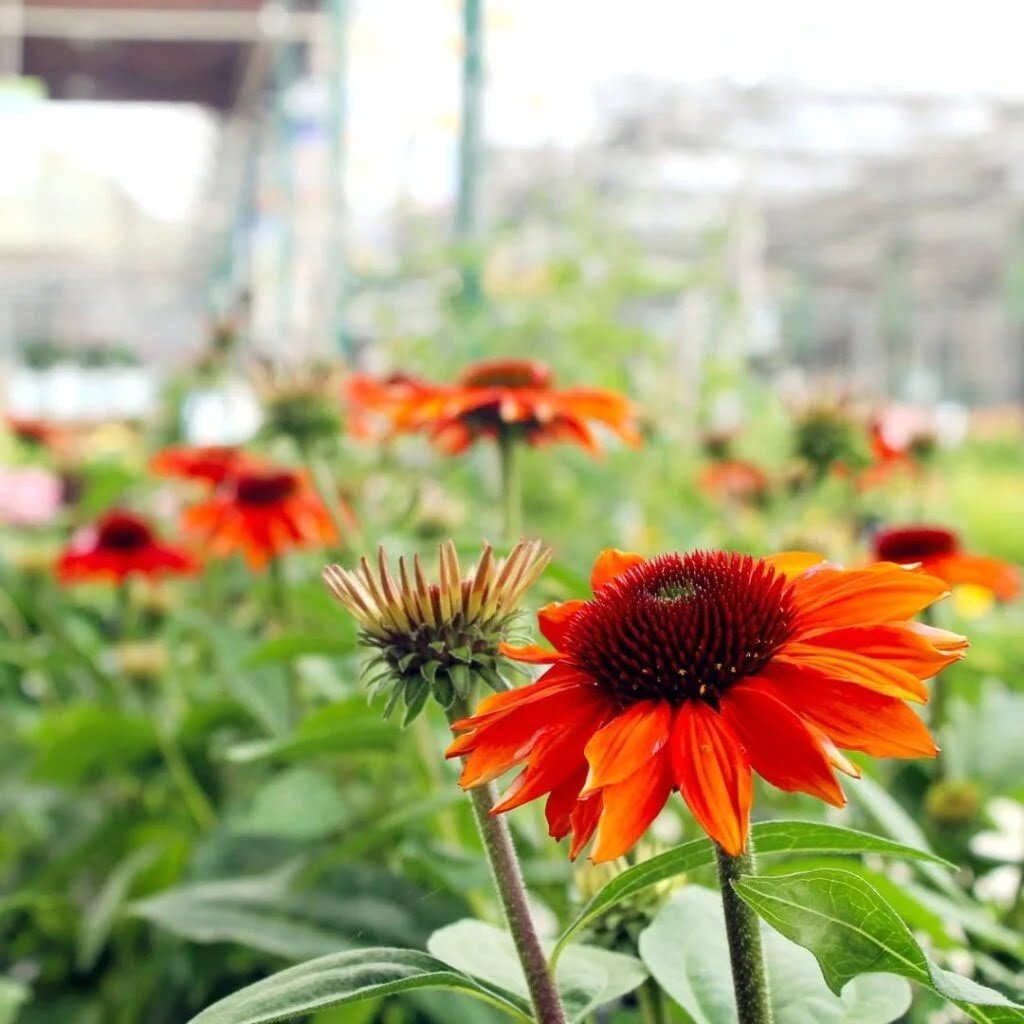
Here’s a short information chart for Coneflower:
| Attribute | Information |
|---|---|
| Botanical Name | Echinacea spp. |
| Plant Type | Herbaceous perennial |
| Soil Type | Well-drained, fertile soil |
| Color Varieties | Various, including purple, pink, white and bi-colors |
| Zones | 3-9 (USDA Hardiness Zones) |
| Exposure | Full sun |
| Bloom Time | Summer to fall |
| Height/Spread | 1-4 feet tall / 1-2 feet wide |
Also known as Echinacea, coneflowers are daisy-like perennials that feature large, prominent center discs surrounded by delicate, drooping petals. While the classic purple coneflower is perhaps the most well-known variety, there are also several stunning orange cultivars available. Coneflowers are drought-tolerant, low-maintenance and attract a variety of pollinators to the garden.
14. Lantana
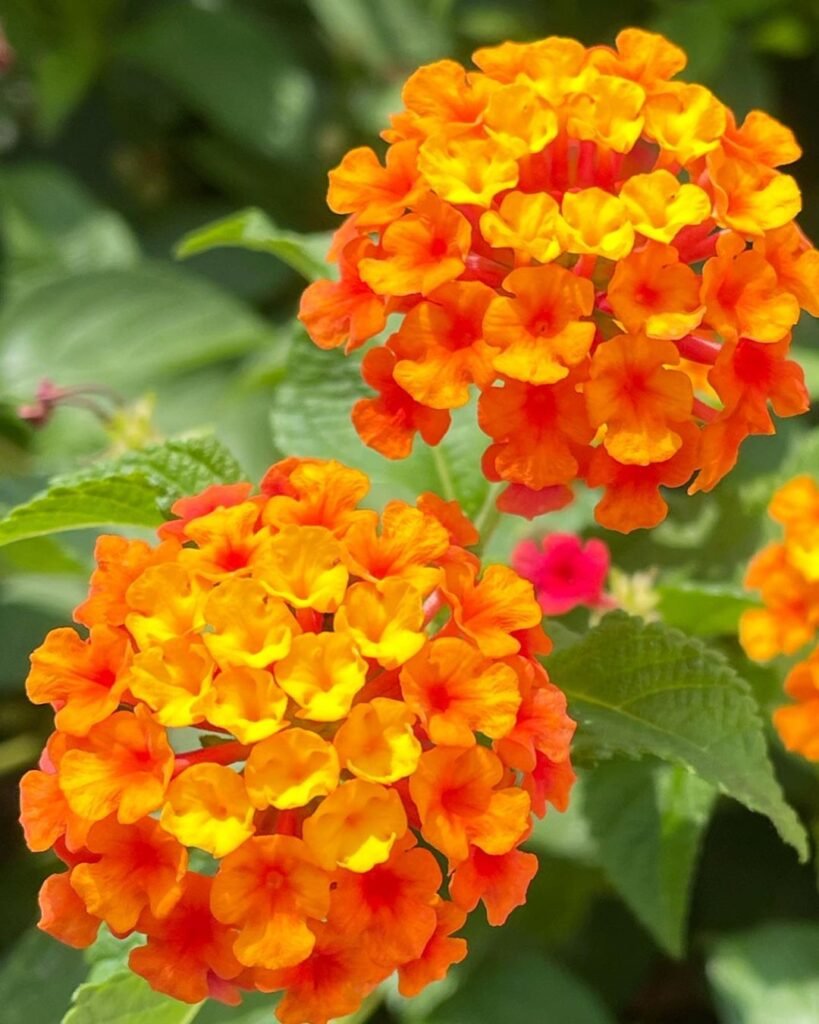
ere’s a short information chart for Lantana:
| Attribute | Information |
|---|---|
| Botanical Name | Lantana spp. |
| Plant Type | Perennial shrub, often grown as an annual in colder climates |
| Soil Type | Well-drained, fertile soil |
| Color Varieties | Various, including yellow, orange, pink, red and bi-colors |
| Zones | 8-11 (USDA Hardiness Zones) |
| Exposure | Full sun |
| Bloom Time | Spring to fall |
| Height/Spread | 1-6 feet tall / 1-4 feet wide |
Lantana is a versatile, heat-loving plant that produces clusters of brightly colored, button-like flowers. These flowers come in a wide range of vibrant hues, including many shades of orange. Lantana makes an excellent choice for borders, hanging baskets, groundcover, and its nectar-rich blooms attract butterflies, hummingbirds and other pollinators.
15. Begonia

Here’s a short information chart for Begonia:
| Attribute | Information |
|---|---|
| Botanical Name | Begonia spp. |
| Plant Type | Annual or perennial |
| Soil Type | Well-drained, fertile soil |
| Color Varieties | Various, including pink, red, orange, yellow, white, and bi-colors |
| Zones | 6-11 (USDA Hardiness Zones) |
| Exposure | Partial shade to full shade |
| Bloom Time | Spring to fall |
| Height/Spread | 6 inches to 3 feet tall / 6 inches to 2 feet wide |
Begonias are lush, tropical-looking plants that feature large, showy flowers in a variety of eye-catching colors, including several orange varieties. These versatile plants can be grown in containers, hanging baskets, as bedding plants and thrive in partially shaded areas. Begonias come in both wax-like “fibrous” forms and tuberous types with more delicate, ruffled blooms.
16. Nasturtium
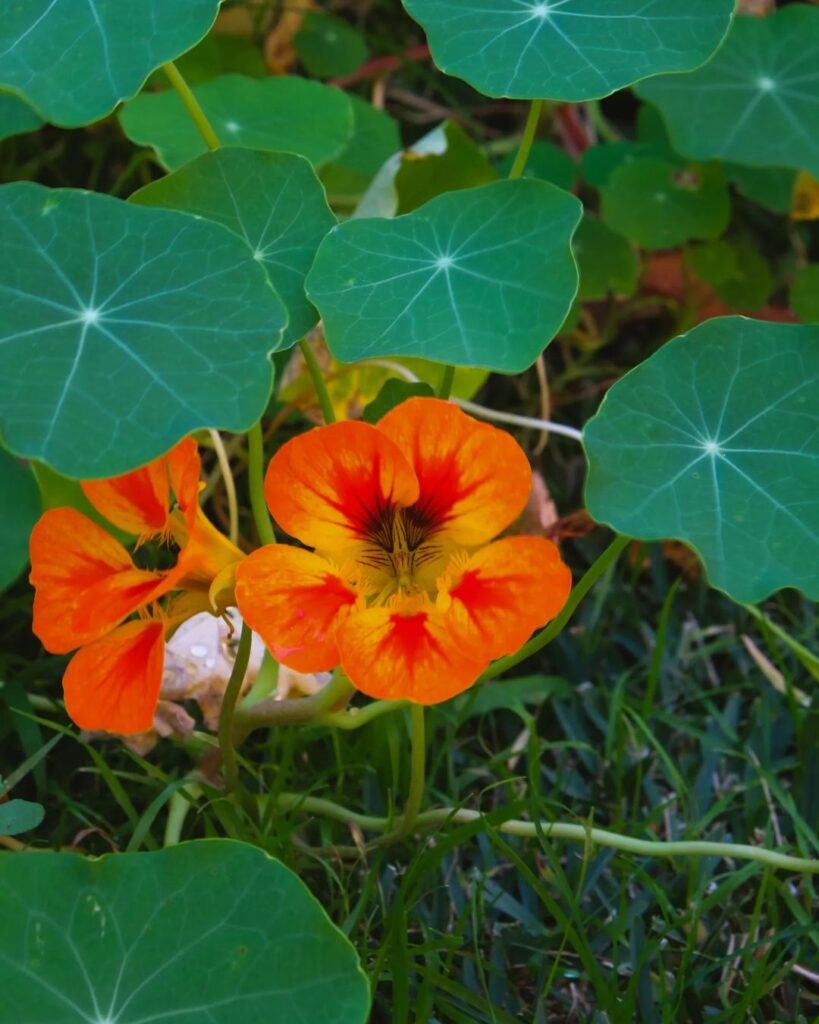
Here’s a short information chart for Nasturtium:
| Attribute | Information |
|---|---|
| Botanical Name | Tropaeolum majus |
| Plant Type | Annual |
| Soil Type | Well-drained, moderately fertile soil |
| Color Varieties | Various, including orange, yellow, red and bi-colors |
| Zones | 2-11 (USDA Hardiness Zones) |
| Exposure | Full sun to partial shade |
| Bloom Time | Summer to fall |
| Height/Spread | 6-12 inches tall / 12-18 inches wide |
Nasturtiums are cheery, trailing plants that produce brightly colored, edible flowers in shades of orange, yellow and red. These carefree annuals are easy to grow, self-seeding readily and thriving in a range of soil conditions. Nasturtiums make excellent ground covers, container plants and additions to edible gardens, where their peppery-flavored blooms can be used to add a pop of color to salads and other dishes.
17. Carnation
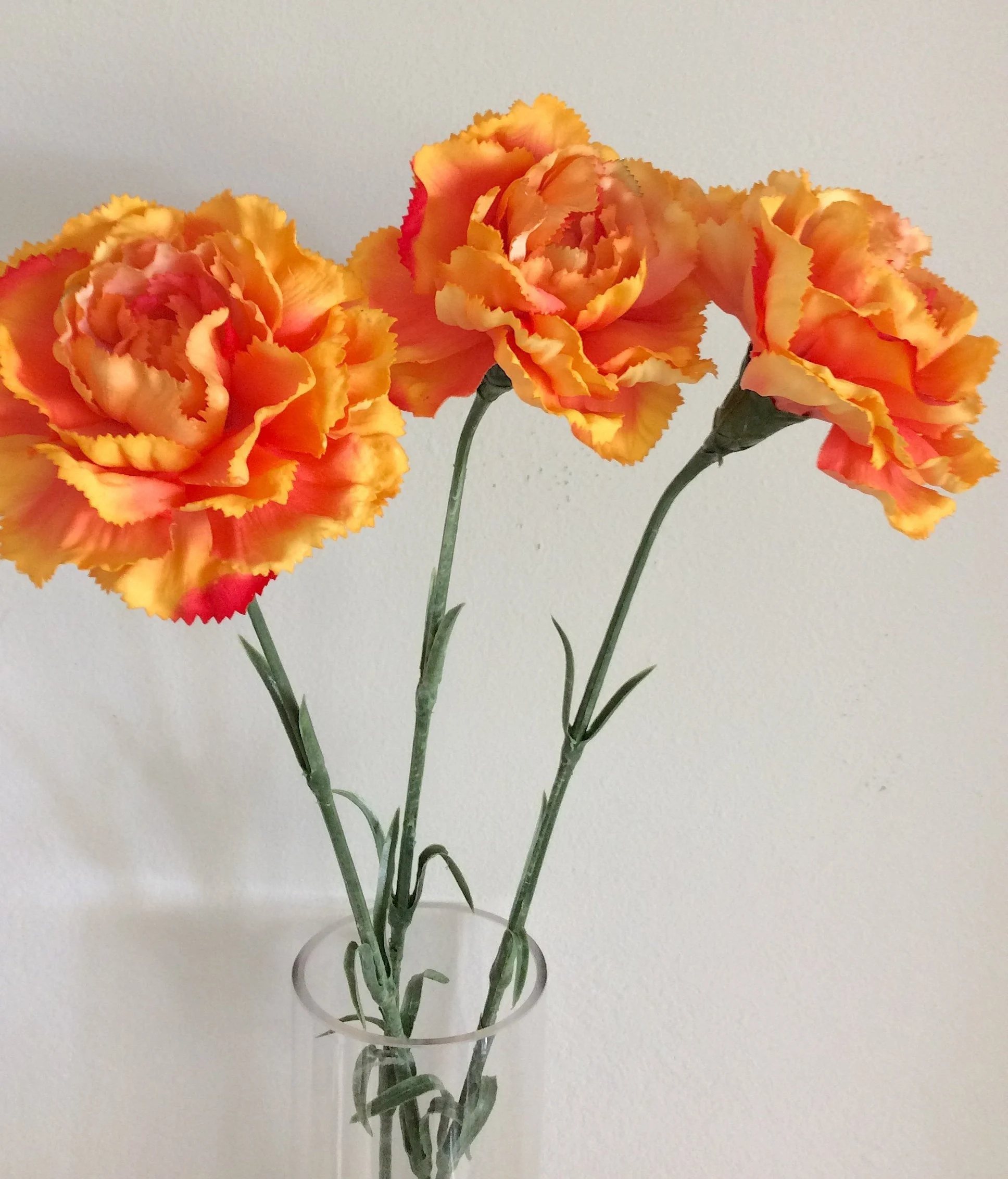
Here’s a short information chart for Carnations:
| Attribute | Information |
|---|---|
| Botanical Name | Dianthus caryophyllus |
| Plant Type | Perennial |
| Soil Type | Well-drained, fertile soil |
| Color Varieties | Various, including white, pink, red, yellow and bi-colors |
| Zones | 3-9 (USDA Hardiness Zones) |
| Exposure | Full sun to partial shade |
| Bloom Time | Late spring to early summer |
| Height/Spread | 12-36 inches tall / 12-18 inches wide |
Carnations are classic, fragrant flowers that feature ruffled, spoon-shaped petals. While pink and red carnations are the most common, there are also several stunning orange varieties available. These long-lasting flowers make excellent cut flowers and are a popular choice for bouquets, corsages, and other floral arrangements.
18. Chrysanthemum

Here’s a short information chart for Chrysanthemums:
| Attribute | Information |
|---|---|
| Botanical Name | Chrysanthemum spp. |
| Plant Type | Perennial |
| Soil Type | Well-drained, fertile soil |
| Color Varieties | Various, including white, yellow, orange, pink, red and bi-colors |
| Zones | 5-9 (USDA Hardiness Zones) |
| Exposure | Full sun to partial shade |
| Bloom Time | Late summer to fall |
| Height/Spread | 1-3 feet tall / 1-2 feet wide |
Chrysanthemums, or “mums” as they are often called, are cheerful, daisy-like flowers that bloom in a wide range of vibrant colors, including several shades of orange. These sturdy, long-lasting plants feature intricate, textured petals and make excellent additions to beds, borders and cut flower arrangements.
19. Poppy

Here’s a short information chart for Poppies:
| Attribute | Information |
|---|---|
| Botanical Name | Papaver spp. |
| Plant Type | Annual or perennial |
| Soil Type | Well-drained, fertile soil |
| Color Varieties | Various, including red, orange, pink, yellow, white and bi-colors |
| Zones | 3-9 (USDA Hardiness Zones) |
| Exposure | Full sun |
| Bloom Time | Spring to early summer |
| Height/Spread | 1-4 feet tall / 1-2 feet wide |
Poppies are delicate, ephemeral flowers that are known for their vibrant, tissue-paper-like petals. While the iconic red poppy may be the most well-known variety, there are also several stunning orange cultivars available. These short-lived annuals self-seed readily and can create dazzling displays in wildflower gardens and naturalized areas.
20. Gerbera Daisy
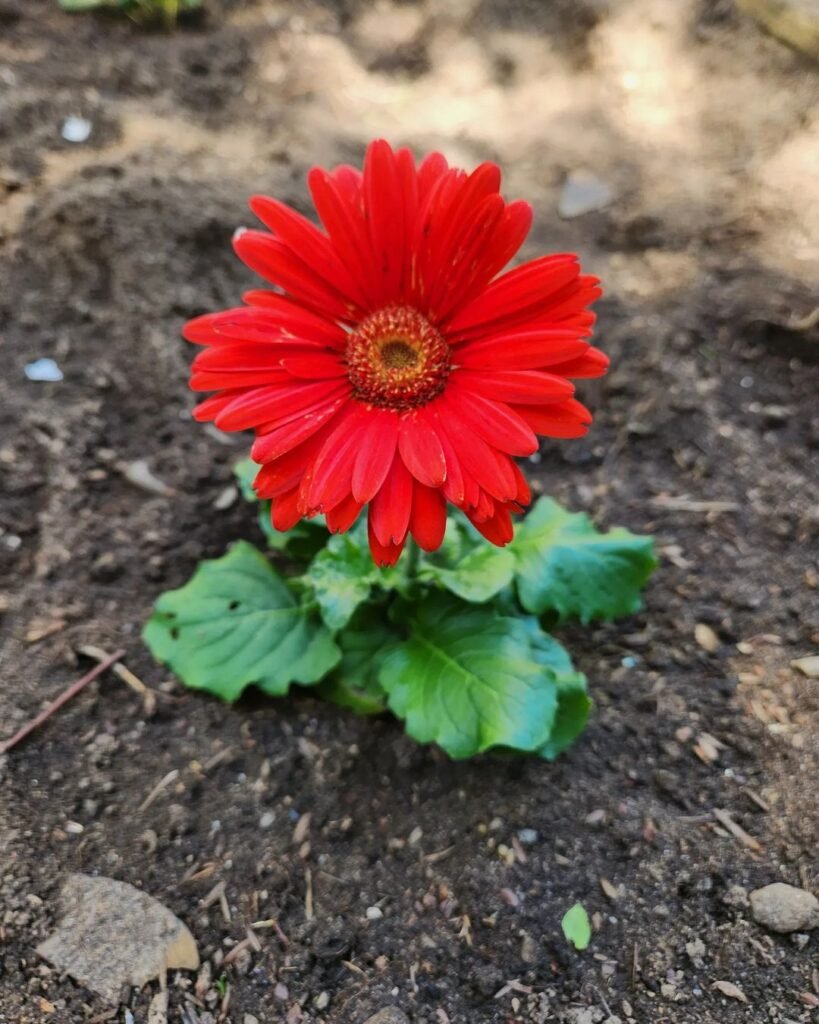
Here’s a short information chart for Gerbera Daisies:
| Attribute | Information |
|---|---|
| Botanical Name | Gerbera jamesonii |
| Plant Type | Perennial |
| Soil Type | Well-drained, fertile soil |
| Color Varieties | Various, including red, orange, yellow, pink, white and bi-colors |
| Zones | 8-11 (USDA Hardiness Zones) |
| Exposure | Full sun to partial shade |
| Bloom Time | Spring to fall |
| Height/Spread | 6-18 inches tall / 12-18 inches wide |
Gerbera daisies are bright, cheerful flowers that resemble classic daisies, but with larger, more dramatic blooms. These vibrant flowers come in a wide array of colors, including several vivid orange shades. Gerbera daisies make wonderful cut flowers and are often used in bouquets, centerpieces and other floral arrangements.
21. Gazania
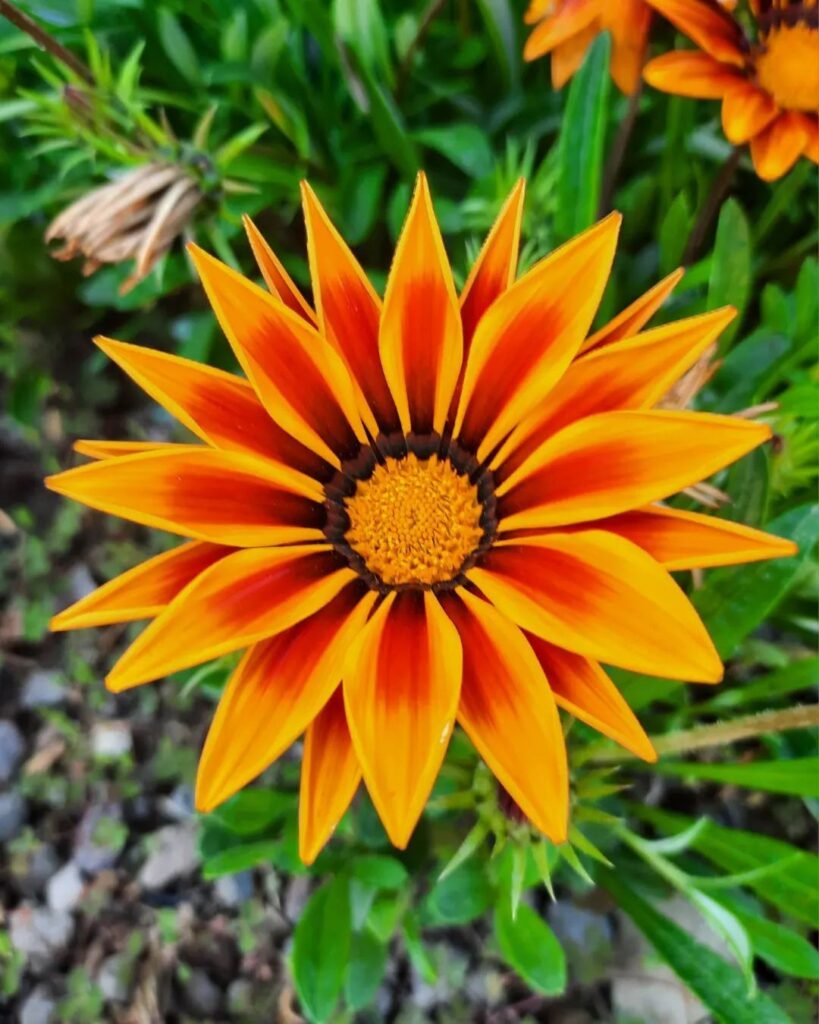
Here’s a short information chart for Gazania:
| Attribute | Information |
|---|---|
| Botanical Name | Gazania spp. |
| Plant Type | Perennial or annual |
| Soil Type | Well-drained, sandy soil |
| Color Varieties | Various, including yellow, orange, red, pink, white and bi-colors |
| Zones | 9-11 (USDA Hardiness Zones) |
| Exposure | Full sun |
| Bloom Time | Spring to summer |
| Height/Spread | 6-12 inches tall / 6-12 inches wide |
Gazanias, also known as African daisies, are low-growing, sun-loving plants that produce daisy-like flowers in a variety of warm, earthy tones. These drought-tolerant plants feature striped, ray-like petals that surround a prominent center disc and they make excellent choices for borders, rock gardens and container plantings.
22. Coreopsis

Here’s a short information chart for Coreopsis:
| Attribute | Information |
|---|---|
| Botanical Name | Coreopsis spp. |
| Plant Type | Perennial |
| Soil Type | Well-drained, sandy or loamy soil |
| Color Varieties | Various, including yellow, orange, pink and red |
| Zones | 4-9 (USDA Hardiness Zones) |
| Exposure | Full sun |
| Bloom Time | Summer to fall |
| Height/Spread | 1-3 feet tall / 1-2 feet wide |
Coreopsis, or tickseed, is a cheerful perennial that produces bright, daisy-like flowers in shades of orange, yellow and red. These carefree plants are drought-tolerant, easy to grow and often self-seed to create naturalized areas in the garden. Coreopsis makes a great choice for borders, meadows and pollinator-friendly gardens.
23. Zinnia Elegans

Here’s a short information chart for Zinnia elegans:
| Attribute | Information |
|---|---|
| Botanical Name | Zinnia elegans |
| Plant Type | Annual |
| Soil Type | Well-drained, fertile soil |
| Color Varieties | Various, including red, orange, yellow, pink, white and bi-colors |
| Zones | 3-10 (USDA Hardiness Zones) |
| Exposure | Full sun |
| Bloom Time | Summer to fall |
| Height/Spread | 6 inches to 3 feet tall / 6 inches to 1 foot wide |
Zinnia elegans, also known as the common zinnia, is a vibrant annual that features large, showy blooms in a wide range of colors, including several orange varieties. These fast-growing plants thrive in hot, sunny conditions and make excellent cut flowers, border plants and additions to annual beds and containers.
24. Helenium

Here’s a short information chart for Helenium:
| Attribute | Information |
|---|---|
| Botanical Name | Helenium spp. |
| Plant Type | Perennial |
| Soil Type | Moist, well-drained soil |
| Color Varieties | Various, including yellow, orange, red and bi-colors |
| Zones | 3-9 (USDA Hardiness Zones) |
| Exposure | Full sun to partial shade |
| Bloom Time | Summer to fall |
| Height/Spread | 1-5 feet tall / 1-2 feet wide |
Helenium, also known as sneezeweed, is a long-blooming perennial that produces daisy-like flowers in vibrant shades of orange, yellow and red. These sturdy plants feature prominent center discs surrounded by delicate, drooping petals and make beautiful additions to borders, meadows and cutting gardens.
25. Crossandra

Here’s a short information chart for Crossandra:
| Attribute | Information |
|---|---|
| Botanical Name | Crossandra spp. |
| Plant Type | Perennial shrub |
| Soil Type | Well-drained, fertile soil |
| Color Varieties | Various, including orange, pink, red and yellow |
| Zones | 9-11 (USDA Hardiness Zones) |
| Exposure | Partial shade to full sun |
| Bloom Time | Summer to fall |
| Height/Spread | 1-3 feet tall / 1-2 feet wide |
Crossandra or firecracker flower, is a tropical perennial that features exotic, fringed blooms in shades of orange and red. These showy flowers arise from the plant’s lush, green foliage, creating a striking visual contrast. Crossandra thrives in warm, humid climates and makes a stunning addition to container gardens, beds and borders.
26. Blanket Flower (Gaillardia)

Here’s a short information chart for Blanket Flower (Gaillardia):
| Attribute | Information |
|---|---|
| Botanical Name | Gaillardia spp. |
| Plant Type | Perennial |
| Soil Type | Well-drained, sandy or loamy soil |
| Color Varieties | Various, including red, orange, yellow and bi-colors |
| Zones | 3-10 (USDA Hardiness Zones) |
| Exposure | Full sun |
| Bloom Time | Summer to fall |
| Height/Spread | 1-3 feet tall / 1-2 feet wide |
Blanket flowers, also known as Gaillardia, are vibrant, daisy-like perennials that bloom in a range of warm, earthy hues including fiery oranges and reds. These carefree plants feature bold, bicolored petals surrounding a prominent center disc and are prized for their long flowering season and ability to thrive in poor soil conditions.
27. Mimulus
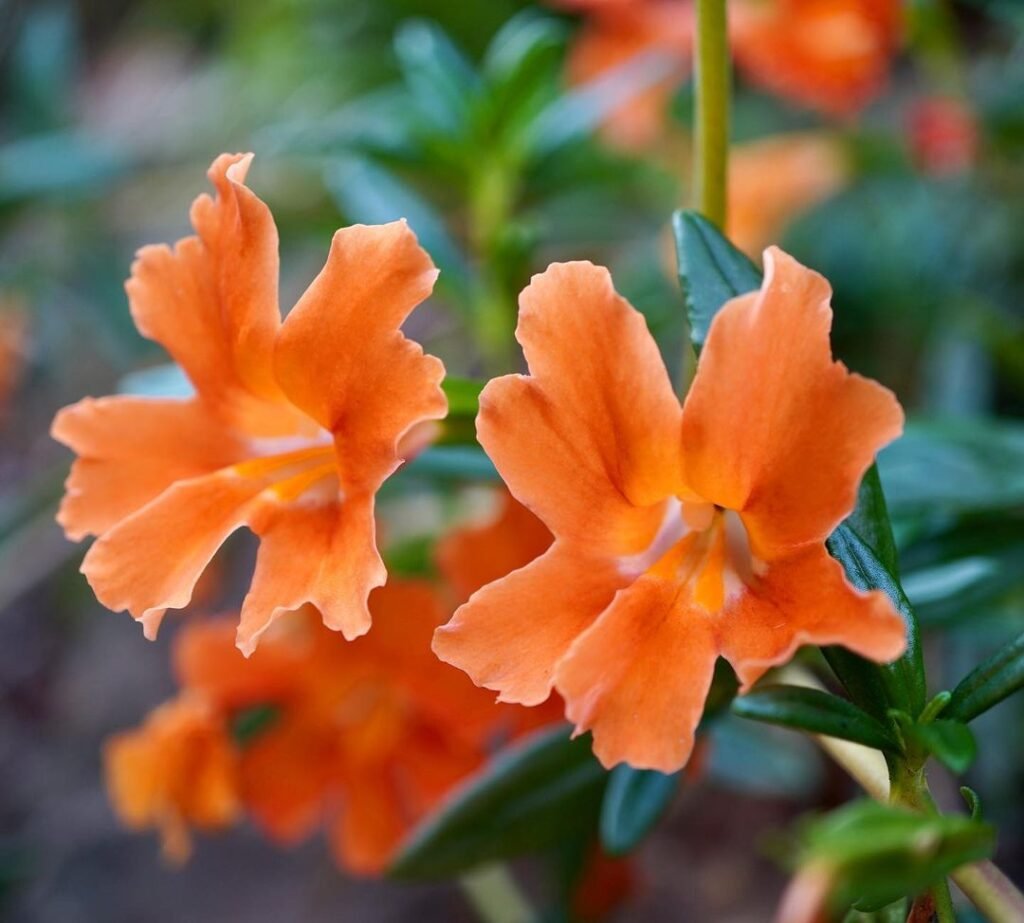
Here’s a short information chart for Mimulus:
| Attribute | Information |
|---|---|
| Botanical Name | Mimulus spp. |
| Plant Type | Annual or perennial |
| Soil Type | Moist, well-drained soil |
| Color Varieties | Various, including yellow, orange, red, pink and white |
| Zones | 5-9 (USDA Hardiness Zones) |
| Exposure | Partial shade to full sun |
| Bloom Time | Spring to fall |
| Height/Spread | 6 inches to 3 feet tall / 6 inches to 1 foot wide |
Also known as monkey flowers, Mimulus are cheerful, face-like flowers that bloom in a variety of vibrant hues, including several shades of orange. These unique, snapdragon-like plants prefer partially shaded areas and moist, well-drained soil. Mimulus make excellent additions to shade gardens, bog gardens and container plantings.
28. Butterfly Weed (Asclepias)

Here’s a short information chart for Butterfly Weed (Asclepias):
| Attribute | Information |
|---|---|
| Botanical Name | Asclepias tuberosa |
| Plant Type | Perennial |
| Soil Type | Well-drained, sandy soil |
| Color Varieties | Orange, occasionally yellow or red |
| Zones | 4-9 (USDA Hardiness Zones) |
| Exposure | Full sun |
| Bloom Time | Summer to early fall |
| Height/Spread | 1-3 feet tall / 1-2 feet wide |
Butterfly weed, or Asclepias, is a native North American wildflower that features distinctive, umbrella-shaped clusters of orange blooms. These nectar-rich flowers attract a wide variety of pollinators, including butterflies, bees and hummingbirds. Butterfly weed is a drought-tolerant, low-maintenance perennial that makes a beautiful addition to meadows, prairies and pollinator gardens.
29. California Poppy

Here’s a short information chart for California Poppy:
| Attribute | Information |
|---|---|
| Botanical Name | Eschscholzia californica |
| Plant Type | Annual |
| Soil Type | Well-drained, sandy soil |
| Color Varieties | Various shades of orange, yellow and occasionally red |
| Zones | 6-10 (USDA Hardiness Zones) |
| Exposure | Full sun |
| Bloom Time | Spring to early summer |
| Height/Spread | 12-18 inches tall / 6-12 inches wide |
The California poppy is the state flower of California and for good reason. These delicate, cup-shaped blooms feature vibrant orange or yellow petals surrounding a prominent center. California poppies are resilient, drought-tolerant annuals that self-seed readily, making them a great choice for wildflower gardens, meadows and naturalized areas.
30. Marigold (Tagetes)

Here’s a short information chart for Marigold (Tagetes):
| Attribute | Information |
|---|---|
| Botanical Name | Tagetes spp. |
| Plant Type | Annual or perennial |
| Soil Type | Well-drained, fertile soil |
| Color Varieties | Various, including yellow, orange, red and bi-colors |
| Zones | 2-11 (USDA Hardiness Zones) |
| Exposure | Full sun |
| Bloom Time | Summer to fall |
| Height/Spread | 6 inches to 3 feet tall / 6 inches to 1 foot wide |
We’ve already covered marigolds earlier in the list, but they’re such a beloved and versatile orange flower that they deserve a second mention. From the classic French marigold to the lush, pom-pom-like African marigolds, these cheerful, fragrant flowers come in a stunning array of warm, fiery hues. Marigolds are easy to grow, low-maintenance and make excellent border plants, container gardens and cut flowers.
Pingback: Six Great Cut Flower Dahlias to Grow: A Simple Guide -
Pingback: Top 5 Fruit Trees You Can Grow Indoors -
Pingback: 16 Types of Yellow Mushrooms (with Pictures) -
Pingback: Trees and Bushes with Beautiful Red Berries
Pingback: 20 Tropical Plants with Vibrant Orange Flowers
Pingback: The 20 Best Hummingbird Flowers Gardeners Schoo
Pingback: 14 Summer Flowers for Your Garden Gardeners Schoo
Pingback: - Aloe Plants: Comprehensive Guide to Growing Aloes
Pingback: The Ultimate Guide to Cleistocactus Icosagonus
Pingback: Discover 18 Stunning Russian Flowers: A Visual Delight -
Pingback: Chili Plants: The Ultimate Guide to Growing Them -
Pingback: Vibrant Viburnum Shrubs: A Beginner’s Guide to Growing Successfully
Pingback: Fruits That Start with “O”: A Complete List -
Pingback: Flowering Maple: A Complete Guide to Growing and Care
Pingback: Freesia Care Guide: From Planting to Blooming
Pingback: Trees That Start with ‘N’: Choosing the Best Guide
Pingback: Guide to Greatness: Discovering Trees That Start with ‘G’ - Gardener's School
Pingback: Flame Lily: A Comprehensive Guide to Growing and Caring
Pingback: Maple Trees : A Complete Guide to Varieties and Care
Pingback: 15 British Garden Birds You Can Find in Your Garden - Gardener's School
Pingback: 17 Beautiful Flowers That Start With B Gardeners School
Pingback: Peggy Martin Climbing Rose : Expert Care and Growing Tips - Gardener's School
Pingback: Coreopsis: Brightening Up Your Garden with Sunshine Blooms
Pingback: How to Grow and Care for Flowering Quince in Your Garden
Pingback: 🌺 Grow Gorgeous Gerbera Daisy Flowers in Your Garden 🌺 - Gardener's School
Pingback: 12 Stunning flowers that start with X | ‘X’ Blooms to Grow in Your Garden
Pingback: Peppers: The Ultimate Guide to Growing From Seed to Plate - Gardener's School
Pingback: Sunflower Doppelgangers : 10 Flowers That Look Like Sunflower
Pingback: Zinnia Flowers : History & Identification - Solano Garden
Pingback: Fruits That Start with “O” : A Complete List -
Pingback: 10 Trees That Look Like the Human Body - Gardener's School
Pingback: Orange Poppies : Vibrant Blooms for Your Garden